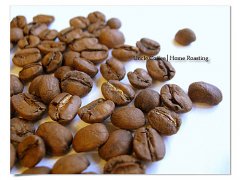Study on Agricultural Ecology of Coffee in Mexico and Dignity of Organic Coffee Farmers in Mexico

For professional baristas, please follow the coffee workshop (Wechat official account cafe_style)
In 1867, coffee rust (coffee rust) broke out in Ceylon, destroying the coffee kingdom established by the British Empire, and the British switched to tea. In 1877, coffee rust also broke out in Indonesia, changing the local habit of growing "Arabica" coffee to "Robusta" coffee. However, 100 years later, coffee rust came to the New World, where it did not cause serious harm to coffee production.
Why is that? Professor John Vandermeer, who studies agroecology at Finca Irlanda, the world's first organically certified Mexican organic coffee farm, thinks his team has the answer.
On farms, must chemicals be used in order to effectively control diseases and insect pests? If we look at "diseases and insect pests" from the perspective of biodiversity, what are the different implications for us? What is the ecological significance of the interaction between these species to explain the absence of outbreaks of coffee rust, green shell beetle (green coffee scale) and coffee fruit beetle (coffee berry borer)? After further research, John Vandermeer's team concluded that the interaction of a species of flea fly (phorid fly), ladybug, ant and fungus with coffee rust, green beetle and coffee fruit beetle provides a reasonable explanation.
In addition, organic coffee production accounts for 1.5% of the global coffee market; this figure also represents the story of small farmers living with dignity in many third world countries. In the coffee market, Fairtrade has a lot to do with organic coffee. 80% of the world's organic coffee is also Fairtrade coffee.
In addition to Finca Irlanda, southern Mexico, has always been the poorest province Chiapas is the best representative of ecological and social justice. Mexico, the world's largest producer of organic coffee, produces about 18.9% organic coffee. Chiapas, the most remote province in the south, has always been one of the poorest and vulnerable provinces in the country and is also an indigenous area. Chiapas alone accounts for 53.5% of the country's organic coffee production. In addition, most of the tens of thousands of tons of coffee beans harvested in Mexico each year come from the cultivation of indigenous small farmers. Small farmers' coffee combines organic, biodiversity and fair trade, and behind it is the moving story of the gathering of small farmers in the ups and downs of the international market. The cooperative system and the collective certification system for small farmers provide another way to survive for ecological and social justice.
Important Notice :
前街咖啡 FrontStreet Coffee has moved to new addredd:
FrontStreet Coffee Address: 315,Donghua East Road,GuangZhou
Tel:020 38364473
- Prev

Mexico Coffee Chiapas │ Mexico directly related to Coffee amethyst Farm Information
Professional baristas exchange please follow the coffee workshop (Wechat official account cafe_style) Mexico is directly related to coffee amethyst farm information Mexico │ Chiapas "Direct-Trade" Pedra Rosa right after the coffee beans, Gemini uncle can not help but taste the impulse, taking advantage of the dark wind high night, immediately turn on the hot pot to try baking one kilogram. With raw beans
- Next

Mexican coffee basically introduces the delicious quality and correct drinking method of Mexican coffee.
Exchange of professional baristas please follow the coffee workshop (Wechat official account cafe_style) Mexican Coffee basic introduction to the delicious quality of Mexican coffee and the correct way to drink Pinyin: mo xi ge ka fei 1 basic introduction 2 delicious quality 3 Mexican coffee drinking Mexican coffee Mexicans are enthusiastic and optimistic, which is perfectly reflected by the chocolate in Mexican coffee. Mexico
Related
- Detailed explanation of Jadeite planting Land in Panamanian Jadeite Manor introduction to the grading system of Jadeite competitive bidding, Red bid, Green bid and Rose Summer
- Story of Coffee planting in Brenka region of Costa Rica Stonehenge Manor anaerobic heavy honey treatment of flavor mouth
- What's on the barrel of Blue Mountain Coffee beans?
- Can American coffee also pull flowers? How to use hot American style to pull out a good-looking pattern?
- Can you make a cold extract with coffee beans? What is the right proportion for cold-extracted coffee formula?
- Indonesian PWN Gold Mandrine Coffee Origin Features Flavor How to Chong? Mandolin coffee is American.
- A brief introduction to the flavor characteristics of Brazilian yellow bourbon coffee beans
- What is the effect of different water quality on the flavor of cold-extracted coffee? What kind of water is best for brewing coffee?
- Why do you think of Rose Summer whenever you mention Panamanian coffee?
- Introduction to the characteristics of authentic blue mountain coffee bean producing areas? What is the CIB Coffee Authority in Jamaica?

